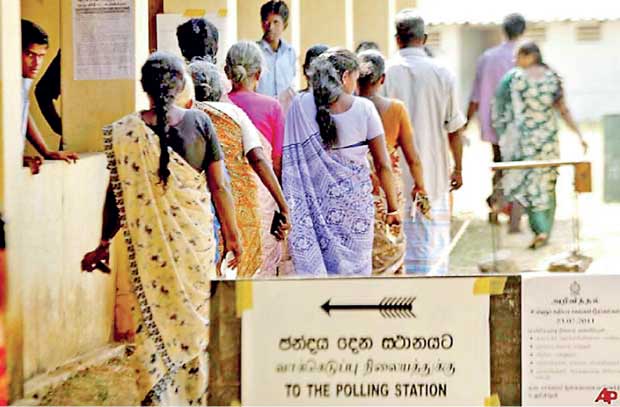Back to square one The long journey in search of a flawless electoral system
The Central Bank bond scam…the ruling UNP’s seeming connivance with it gave an added pace
The new mixed electoral system also contributed to the high visibility of Government’s election defeat
Government does not have any viable economic programme to win over the masses
Govt. doesn’t have sufficient time to implement a programme, even if it had one

Three years after the last Presidential Election the political balance of power in the country has changed diametrically with the loyalists of former President Mahinda Rajapaksa and the anti-Rajapaksa camp swapping positions.
The Rajapaksa’s camp that was by then at the receiving end is on the offensive now- after the February 10 Local Government elections, whereas the main adversaries of it, the United National Party (UNP) and the Sri Lanka Freedom Party (SLFP) are on the defensive and beleaguered.

The tide has started to turn in favour of the former President from the very first year of the Yahapalanaya Government with the Government failing to keep its promise on much-talked-about eradication of corruption, while the “Rise with Mahinda” campaign initiated by the smaller parties in the Rajapaksa camp, especially the National Freedom Front (NFF) led by former Minister Wimal Weerawansa gaining a steady momentum.
The Central Bank bond scam which might be the biggest or one of the biggest corruption cases in Sri Lankan history and the ruling UNP’s seeming connivance with it gave an added pace to this turn of the tide.
Given the defensive and defeatist tone in the comparatively less-frequent statements made now by the leaders of the Government, the tide seems to have taken a qualitative turn after the recent Local Council Elections, the results of which have baffled those who joined hands about three years against President Mahinda Rajapaksa, who was considered then to be invincible.
Holding LG Elections countrywide, without conducting them on a staggered basis is good, but the Government did not drag on with those elections in such good faith, though it attributed the delay to the delimitation process
The outcome of the Local Government Elections had been inevitable given the Government, especially the UNP - the main party in the Government- having damaged its credibility with its insincerity in keeping its election pledges on eradication of corruption, economic development especially creating one million job opportunities in five years and holding the local polls in time.
The results of these elections would not have been the same had the Government held the elections for the Local Councils the term of which had ended in 2015 in the same year, as the Presidential and Parliamentary Elections held in that year would have had an influence on them.
Then the results of those LG Elections would, in turn, have influenced elections for the Local Councils that had stood dissolved in 2016 as well, saving the day for the Government.
Had the Government also been serious and sincere in its pledge on cracking down on the high profile corruption committed during the previous regime, anti-Government forces would not have regrouped and there wouldn’t have been a Joint Opposition or a Sri Lanka Podujana Peramuna (SLPP) by now.
Holding LG Elections countrywide, without conducting them on a staggered basis was good, but the Government did not drag on with those elections in such good faith, though it attributed the delay to the delimitation process.
Finally, it had to face the music when it held the elections at a time when one-third of the people, who voted for the UNP three years ago, had rejected it and the Mahinda wave was at its peak.
The new mixed electoral system also contributed to the high visibility of Government’s election defeat.
It is with this Mahinda wave sweeping the Sinhalese dominated areas in the country the UNP, SLFP and the Janatha Vimukthi Peramuna (JVP) have to face the forthcoming Provincial Council elections, probably this year, and the Presidential and Parliamentary Elections in 2020.
Had the Government also been serious and sincere in its pledge on cracking down on the high profile corruption committed during the previous regime, anti-Government forces would not have regrouped and there wouldn’t have been a Joint Opposition or a Sri Lanka Podujana Peramuna (SLPP) by now
If the Provincial Council elections are held this year at least for the already dissolved three councils and another three to be dissolved in September, the results of those elections would not be very different than those of the February LG elections. And that will have a bearing in turn on the results of the next Presidential and
Parliamentary elections.
The Government does not have any viable economic programme to prevent this by addressing the economic woes faced by them or sufficient time to implement such a programme, even if it had one.
On the other hand despite the total votes gained by the parties against the SLPP is much higher than what the SLPP had bagged at the LG polls, finding another common candidate against the candidate of the Rajapaksa camp at the next Presidential Election, as happened in 2015, would be a pipedream.
And it might also be counterproductive for the Government sometimes to expedite the cases against the corruption committed during the last regime, given the rising Mahinda wave.
Therefore, the leaders of the Government might attempt to minimize the damage by clinging on to the Proportional Representation (PR) system in respect of the forthcoming Provincial Council and Parliamentary Elections.
Though the Government had managed to pass the Provincial Councils Elections Amendment Bill in September with provisions for the mixed electoral system for Provincial Councils as well, it has been challenged by the SLPP Chairman Professor G.L. Peiris and former Chief Justice Sarath N. Silva in court on the grounds that the said provisions had been sneaked into the Bill as an amendment at the Committee Stage of the Parliamentary debate on the Bill. The Government might be happy with the cases now.
Now that the mixed electoral system has also run into controversies after the recent LG polls with even the former President whose group swept the Local Councils in seven out of nine Provinces wanting it to be changed, the Government might attempt to revert to the PR system in all elections in the future.
It would be the next chapter of the country’s journey in search of a flawless electoral system, which was an interesting story.
We, along with many other former British colonies had the First-Past-the-Post system after Independence and President J.R. Jayewardene changed it with the Second Republican Constitution of 1978, on the grounds that parties that get more votes get fewer seats.
For instance, the UNP had received more votes than the winning Mahajana Eksath Peramuna (MEP) at the 1956 General Elections, whereas the seat ratio of the two parties stood ridiculously at 8:87.
The preferential voting system was not included when the PR system was first introduced. Political party leaders had to appoint members to the councils, on the basis of the number of slots their parties had won at an election.
However, when the Local Government elections were held under the PR system first, it was witnessed that the candidates in the list who were not favourites of the leaders were reluctant to work hard and spend their money during the elections, as their chances of being appointed were minimal. Thus, the controversial manape or the preferential voting system was introduced to encourage all candidates alike.
However, Jayewardene introduced three preferential votes instead of one, probably to provide two more options for the voter, in case he/she does not prefer the candidate from his area.
Nevertheless, it turned out to be a curse for the country, as it was the main cause of intra-party violence, corruption and huge election expenditure by candidates.
Apart from this, the PR system deprived the voters of a member responsible for their area.
Had Jayewardene introduced one preferential vote, with candidates being assigned to specific electorates or wards, the intra-party rivalry could have been reduced.
Then in 2003, all political parties agreed to find out a suitable electoral system for the country and agreements were reached to apply a mixed system of PR and FPP systems.
In 2012 a law was enacted for the new system to be first introduced to the LG elections, but it increased the number of members in councils.
With the ratio of the members elected under first-past-the-post system and PR system being changed to 40:60 from 30:70 under the present Government, the number of Local Government members doubled.
Now, again the country is back to square one, finding the world’s best electoral system.

